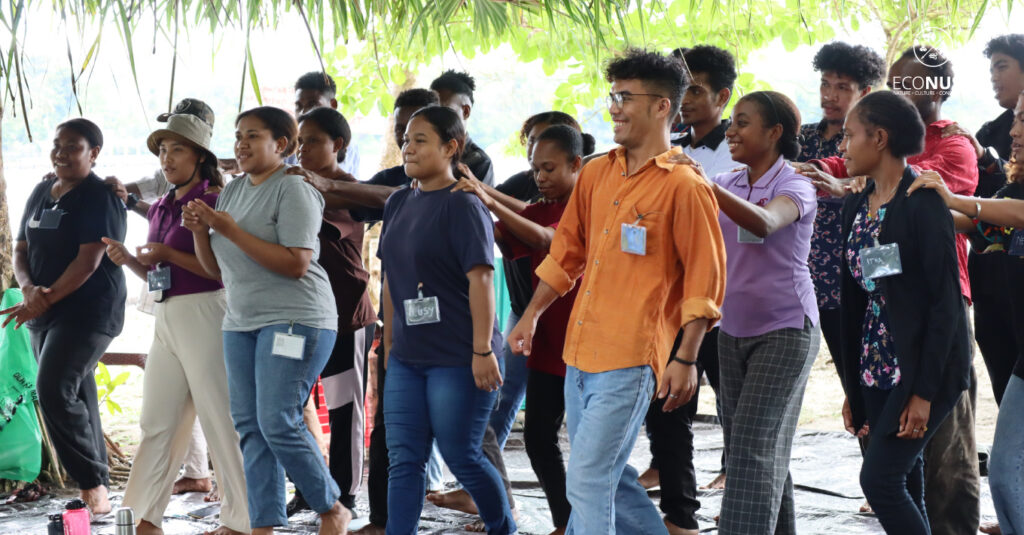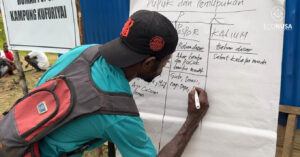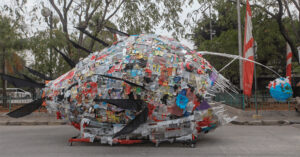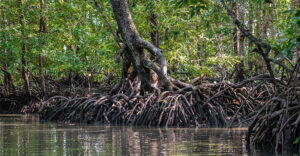
The young generation who are environmentally conscious have an important role in controlling the climate crisis. The young people, as the next generation, will experience the impact of climate change at the same time, they’ll become the future leaders.
“Youth are at the forefront of protecting the environment. Because, these young people will become leaders, whether they become ministers, presidents, chairpersons of the DPR (People’s Representative Council), governors, or regents,” said the Director of Communication and Youth Mobilization of the EcoNusa Foundation, Nina Nuraisyiah, when opening the Youth Camp activity Manokwari 2023 on Lemon Island, Thursday, 30 March 2023.
Read also: Sasi on Lemon Island, An Initiative from Local Youth to Protect Marine Biodiversity
A total of 23 young people who live in Manokwari, West Papua, joined the Youth Camp (30/3-2/4). This activity was organized by the Manokwari EcoDefender community in collaboration with the Manokwari Regency Environmental Service, Violaceoflavens, and Smilax Gank, with the support of the EcoNusa Foundation.
During the activity, participants learned and discussed ecological crises, environmental ethics, community organizing, and digital campaigns via social media. Moreover, all participants were able to take action in preserving the ecosystem through direct activity of beach clean up, tree planting and coral reef transplant.
Expert Staff for Law and Politics, Maria Magdalena Rumere, the Regent of Manokwari Hermus Indou welcomed the activity. According to her, this Youth Camp will be one of the ways to create new youth cadres that care about wealth and biodiversity, especially in Manokwari. It is hoped that this activity will have a major impact on the progress of youth in West Papua. “I also hope that this activity can generate new environmentalists in Manokwari,” she explained.
Read also: Muara Gembong Youth are Going Digital to Voicing Out Their Disquiet
Yohanes Lebang from the Department of Environment and Land Affairs of Manokwari Regency said there are many ways that can be taken to control the climate crisis. Some of them can even generate profit. For example by reprocessing plastic waste or by cultivating maggot to overcome the problem of organic waste. The maggots can be sold as animal weft. “We have to discuss more on the economic side as well. This is what is called a circular economy,” he said.
To drive progressive changes, said Bentara Director Yanuarius Anouw, community organizing is needed. Organizing communities can not only be done by young people in the city, but also those who live in rural areas and villages. “How to involve them so they can have a similar understanding with us. Thus, they can fight against the habits that are detrimental to them on their own,” he said.
Change can also start from social media. Especially in today’s digital era, most people use social media freely. “We can use social media for campaigns. We can start by posting the anxiety we feel,” said Andi. He added, because people come to social media to relax, don’t forget to insert entertainment into the posts.
Read also: Youth Action to Mitigate Climate, A Collaborative Youth Action to Reduce Climate Crisis Impact
The youth camp activities aim to invite Manokwari youth to be more aware of environmental issues, train young people to be able to analyze the problems, and build networks of fellow youth in the Manokwari area for efforts to protect forests and the sea.
Jeanny Mansawan, one of the participants in the Youth Camp said, to make changes to the environment, she needed to join a local community so they could move and encourage each other together. Previously, she had participated in youth training at the national level. “I need friends here, so we can help each other,” she said. After participating in this activity, the participants officially joined the EcoDefender community.
On the third day of the camp, the participants made an action plan for the activities they would do in the next few months. They formed three groups and each group presented their plans. Some plan to campaign on campus by inviting their friends to watch environmental films together, some plan to make eco-enzymes a solution to the organic waste problem. Another group focused on the problem of plastic waste reduction.
“This activity made me aware of the natural potential that can be utilized around us, I also learned a lot. Moreover, all of us were actively involved in all parts of the camp. I am usually very shy but during this camp I was able to express my opinions,” said Fika Carnela Ayomi, participant of the 2023 Manokwari Youth Camp.
Translator: Syahwa Aurelita and Swinny Adestika




